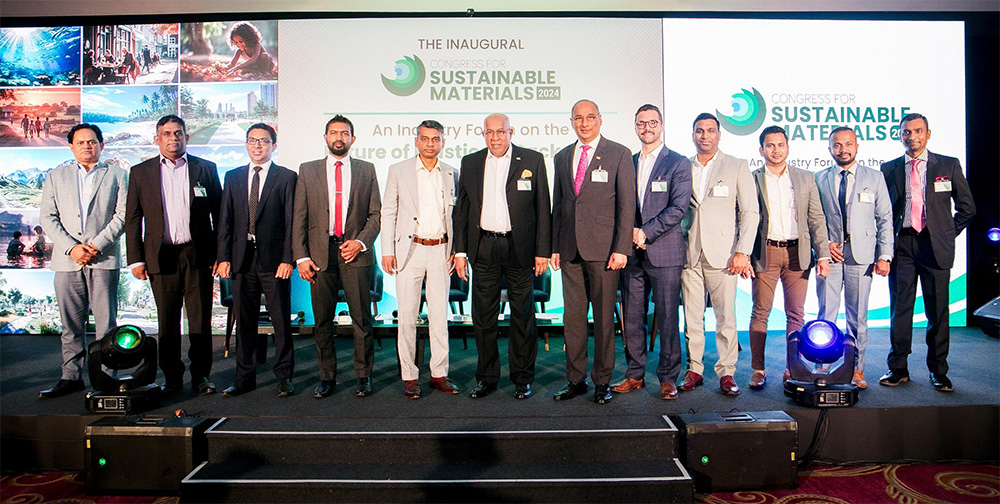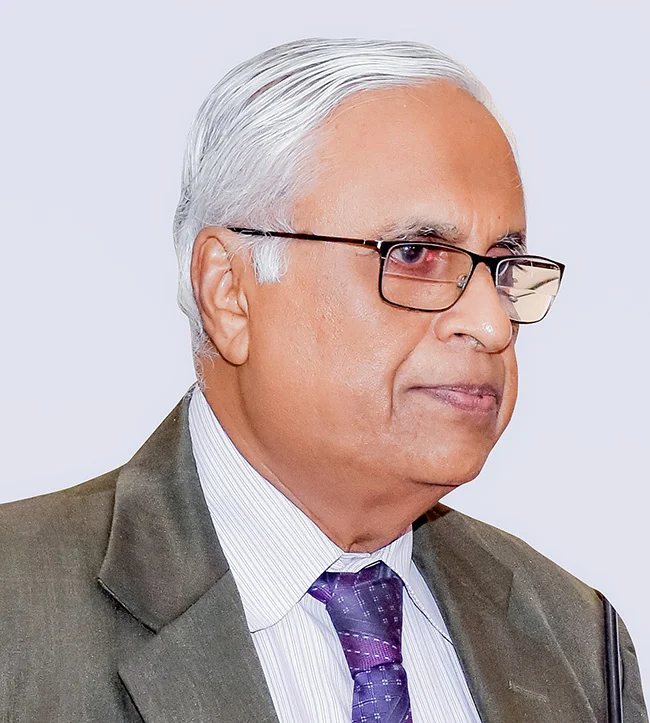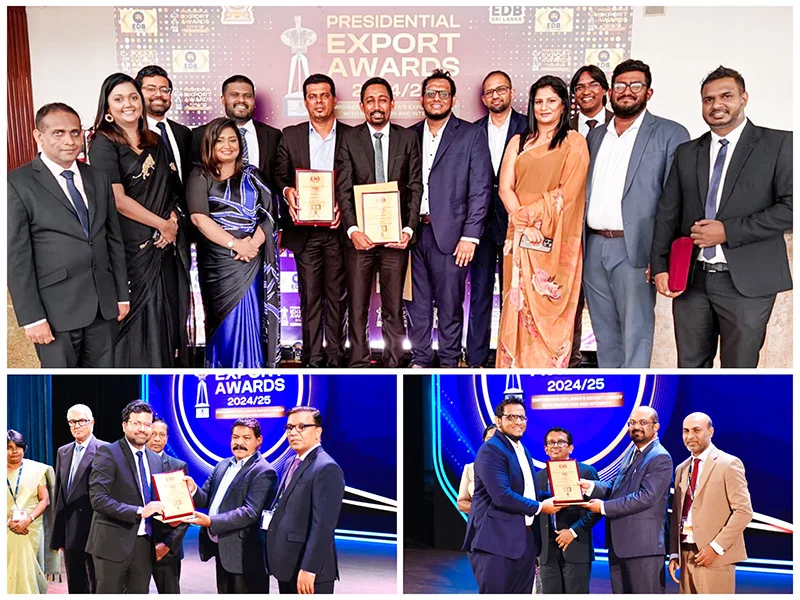Business
Congress for Sustainable Materials 2024 focuses on responsible plastic use

Hayleys Aventura (Pvt) Ltd, a subsidiary of Hayleys PLC, recently hosted the inaugural Congress for Sustainable Materials 2024 at the Kingsbury Hotel, Colombo, with this year’s theme based on ‘The Future of Plastics & Packaging.’
The Congress showcased two panels, each representative of various industries such as Agriculture, Food, Packaging, Textiles, and Gloves in Sri Lanka. The event garnered participation from over 80 companies spanning diverse sectors, with attendees also hailing from Bangladesh, the USA, and the Maldives. Furthermore, a global audience engaged with the proceedings through live streaming, amplifying the event’s reach and impact.
As plastic consumption rises in Sri Lanka, the issue of non-biodegradable waste becomes increasingly critical. Landfills, expanding due to materials like plastics that take centuries to degrade, necessitate urgent action. The country has struggled with inadequate waste management systems and limited infrastructure for recycling, leading to significant environmental issues. While there were local initiatives and efforts to promote recycling, the overall success rate of these initiatives was negligible compared to the volume of waste generated, with only 5% of total plastic waste being recycled in Sri Lanka.
Plastics remain an integral part of various industries due to their versatility and cost-effectiveness. Acknowledging the critical function of plastics in Sri Lankan value chains, the panel emphasized the importance of responsible plastic management. While complete elimination may not be feasible, prioritizing reuse, recycling, and responsible disposal will ensure a sustainable future for both the industry and the environment.
They also explored innovative ways to maintain the benefits of traditional plastics while reducing the environmental footprint and recommended responsible plastic use, encouraging efforts such as reduction, reuse, and recycling.
Business
Sri Lanka Customs exceeds revenue targets to enters 2026 with a surplus of Rs. 300 billion – Director General

The year 2025 has been recorded as the highest revenue-earning year in the history of Sri Lanka Customs, stated Director General of Sri Lanka Customs, Mr. S.P. Arukgoda, noting that the Department had surpassed its expected revenue target of Rs. 2,115 billion, enabling it to enter 2026 with an additional surplus of approximately Rs. 300 billion.
The Director General made these remarks at a discussion held on Tuesday (30) morning at the Sri Lanka Customs Auditorium, chaired by President Anura Kumara Dissanayake.
The President visited the Sri Lanka Customs Department this to review the performance achieved in 2025 and to scrutinize the new plans proposed for 2026. During the visit, the President engaged in extensive discussions with the Director General, Directors and senior officials of the Department.
Commending the vital role played by Sri Lanka Customs in generating much-needed state revenue and contributing to economic and social stability, the President expressed his appreciation to the entire Customs employees for their commitment and service.
Emphasizing that Sri Lanka Customs is one of the country’s key revenue-generating institutions, the President highlighted the importance of maintaining operations in an efficient, transparent and accountable manner. The President also called upon all officers to work collectively, with renewed plans and strategies, to lead the country towards economic success in 2026.
The President further stressed that the economic collapse in 2022 was largely due to the government’s inability at the time to generate sufficient rupee revenue and secure adequate foreign exchange. He pointed out that the government has successfully restored economic stability by achieving revenue targets, a capability that has also been vital in addressing recent disaster situations.
A comprehensive discussion was also held on the overall performance and progress of Sri Lanka Customs in 2025, as well as the new strategic plans for 2026, with several new ideas and proposals being presented.
Sri Lanka Customs currently operates under four main pillars, revenue collection, trade facilitation, social protection and institutional development. The President inquired into the progress achieved under each of these areas.
It was revealed that the Internal Affairs Unit, established to prevent corruption and promote an ethical institutional culture, is functioning effectively.
The President also sought updates on measures taken to address long-standing allegations related to congestion, delays and corruption in Customs operations, as well as on plans to modernize cargo inspection systems.
The discussion further covered Sri Lanka Customs’ digitalization programme planned for 2026, along with issues related to recruitment, promotions, training and salaries and allowances of the staff.
Highlighting the strategic importance of airports in preventing attempts to create instability within the country, the President underscored the necessity for Sri Lanka Customs to operate with a comprehensive awareness of its duty to uphold the stability of the State, while also being ready to face upcoming challenges.
The discussion was attended by Minister of Labour and Deputy Minister of Finance and Planning, Dr. Anil Jayanta Fernando, Deputy Minister of Economic Development, Nishantha Jayaweera, Secretary to the President, Dr. Nandika Sanath Kumanayake, Deputy Secretary to the Treasury, A.N.Hapugala, Director General of Sri Lanka Customs, S.P.Arukgoda, members of the Board of Directors and senior officials of the Department.
Business
Construction industry offers blueprint for Sri Lanka’s recovery

The dawn of 2026 represents a time for critical recalibration, not just ceremony, for the nation’s vital construction sector, says Eng Nissanka N Wijeratne, Secretary General/CEO of the Chamber of Construction Industry (CCI).
In a New Year message, Wijeratne reframes the annual greeting as a strategic call to action. “For Sri Lanka’s construction industry – the true backbone of our economy – the turning of the calendar is an ideal moment for a realistic and forward-looking assessment,” he states.
His vision sketches a practical blueprint where the unprecedented challenges of the recent past become the foundation for a smarter, more sustainable future.
The industry, long considered a barometer of national prosperity, has weathered severe headwinds: economic volatility and spiraling material costs. “These were not mere business cycles, but unprecedented tests,” Wijeratne notes, acknowledging the severe strain on firms and professionals. Yet, the sector’s response, he observes, has been “nothing short of remarkable,” showcasing a deeply ingrained resilience.
The Chamber’s chosen theme for the year, “Resilience through Innovation,” signals a pivotal shift from enduring hardship to actively engineering progress.
The pathway forward, Wijeratne outlines, is built on three interdependent pillars.
First is the revitalization of Infrastructure. “This is not a simple call for new projects,” he clarifies, “but a strategic push to reactivate stalled ventures and initiate sustainable developments in concert with the government and international agencies.” He emphasises that construction activity is intrinsically linked to the broader economy’s pulse, where resuming projects catalyses employment, energises supply chains, and restores public confidence.
The second pillar, technological Integration, addresses the urgent need to modernise the sector’s core. Advocacy for Building Information Modeling (BIM), green building practices, and digital project management is a direct answer to past inefficiencies. “It is a commitment to ensuring Sri Lankan construction is not just rebuilt, but upgraded becoming more competitive, cost-effective, and environmentally responsible,” Wijeratne says. ” Innovation must move from slogan to practice, transforming how the nation conceives, builds, and maintains its infrastructure,” he notes.
The third pillar, consistent policy advocacy, underpins all efforts. The Chamber positions itself as a vital intermediary, fighting for fair pricing mechanisms, streamlined regulations, and a protective framework for local contractors. Wijeratne stresses that the best-laid plans of engineers can falter without a conducive policy environment, calling for a strengthened partnership with the state to create a level playing field where skill and enterprise determine success.
Ultimately, Wijeratne’s message is a powerful reminder of the industry’s profound legacy. “When we build, the nation grows,” he states, elevating construction from a commercial activity to a national mission. The structures that rise from the ground are more than concrete and steel; they are the schools, hospitals, roads, and homes that shape the nation’s future.
As Sri Lanka steps into 2026, the construction industry’s message is clear: it is ready to transform resilience from a trait of survival into a dynamic force for innovation.
The past challenges, according to Wijeratne, have been met with grit. Now, the future must be built with vision.
By Sanath Nanayakkare
Business
Expo Commodities and STAY Naturals honoured at the Presidential Export Awards 2024/25

Expo Commodities (Pvt) Ltd, together with its member company STAY Naturals (Pvt) Ltd, has been recognized with Merit Awards at the Sri Lanka Export Development Board (EDB) Presidential Export Awards 2024/25, one of the country’s most prestigious platforms celebrating export excellence.
The awards were presented under the categories of Spices and Allied Products and Essential Oils, Oleoresins & Condiments, recognizing the companies’ consistent performance, product quality, and contribution to strengthening Sri Lanka’s presence in global markets.
The recognition reflects Expo Commodities’ continued focus on delivering high-quality, value-added Sri Lankan products while upholding international standards across innovation, sustainability, and responsible sourcing. Through STAY Naturals, the group has expanded its reach in key export markets, promoting Sri Lanka’s essential oils, oleoresins, and condiments derived from its rich agricultural heritage to customers worldwide.
The achievement also reflects the collective effort, technical expertise, and commitment of the teams behind the operations, alongside the continued trust of global partners and customers. Expo Commodities (Pvt) Ltd, part of Expo Commodities Global, is strategically focused on driving sustainable export growth and strengthening Sri Lanka’s global positioning as a reliable supplier of high-quality natural products.
Expo Commodities Global is a globally active Agri-commodity enterprise with operations spanning multiple origins including Sri Lanka, Vietnam, Indonesia, Madagascar, Comoros, Egypt, the UAE, India, Germany, and the Netherlands. The company specializes in the production, processing, and export of premium organic and conventional spices, coconut products, essential oils, oleoresins, and value-added agricultural products, delivering consistent quality through integrated and sustainable operations.
Expo Commodities Global and STAY Naturals (Pvt) Ltd are part of Aberdeen Holdings, a diversified Sri Lankan conglomerate with interests across pharmaceuticals, packaging, commodities, transport and logistics, power generation, and digital innovation, supporting long-term growth through strong governance, sustainability, and global market engagement.
-

 News6 days ago
News6 days agoBritish MP calls on Foreign Secretary to expand sanction package against ‘Sri Lankan war criminals’
-

 News5 days ago
News5 days agoStreet vendors banned from Kandy City
-

 Sports6 days ago
Sports6 days agoChief selector’s remarks disappointing says Mickey Arthur
-

 Opinion6 days ago
Opinion6 days agoDisasters do not destroy nations; the refusal to change does
-

 Sports2 days ago
Sports2 days agoGurusinha’s Boxing Day hundred celebrated in Melbourne
-

 News5 days ago
News5 days agoLankan aircrew fly daring UN Medevac in hostile conditions in Africa
-

 Sports3 days ago
Sports3 days agoTime to close the Dickwella chapter
-

 Sports6 days ago
Sports6 days agoRoyal record crushing innings win against Nalanda













